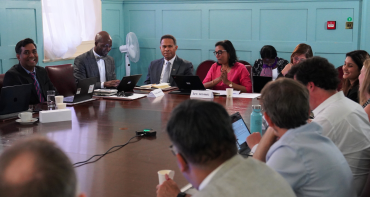Commonwealth Deputy Secretary-General Deodat Maharaj today called for urgent agreement on harmful fishing subsidies to protect the trade and development interests of small states, which heavily depend on exports from this sector.

Commonwealth Deputy Secretary-General Deodat Maharaj today called for urgent agreement on harmful fishing subsidies to protect the trade and development interests of small states, which heavily depend on exports from this sector.
Agreement will not only seek to advance the trade-related aspects of the Sustainable Development Goals but also strengthen the multilateral trading system at a time of increased protectionism and a global economic slowdown, he said.
Mr Maharaj was speaking at the opening session of a specially-convened forum on fisheries and trade hosted by UNCTAD in Geneva. The Oceans Forum is bringing together policymakers and experts on the sustainable use of ocean resources and takes place in the run-up to two landmark conferences later this year. These are the High Level United Nations Conference to Support the Implementation of Sustainable Development Goal 14 in New York in June and the 11th WTO Ministerial Conference in Buenos Aires in December 2017. Results from the forum will feed into these meetings. Mr Maharaj pointed out that there is a short timeframe in which to develop proposals, overcome definitional issues and work towards securing an outcome.
Ahead of today’s speech, the Deputy Secretary-General commented: “ĚÇĐÄĚ˝»¨â€™s work on trade and the blue economy, including on maritime boundaries has contributed to raising awareness of the gap in governance around the sustainable use of oceans. Many of the Commonwealth’s members are small island developing states or coastal states, heavily dependent on fishing. Overexploitation of marine resources as a result of destructive subsidies will impact negatively on economies. In addition, hundreds of millions of people rely on the oceans for their livelihoods and risk being driven back into poverty. In the context of a global economic slowdown, and as countries look to the international trading system for support, it is important to urgently plug these gaps.”
The meeting in Geneva will focus on policy and regulatory options for advancing the implementation of trade in fish related targets under SDG 14 by drawing on global, regional and cross-country experiences, sharing lessons, sensitising development partnerships and designing more effective support measures. Mr Maharaj commended the momentum garnered by the partnership between the Commonwealth and UNCTAD in pushing for outcomes on effective trade governance.
His speech also highlighted the importance of regional value chain development. “This level of market access matters, particularly for small-scale and artisanal producers and in view of the linkages between the fisheries sector, transportation and tourism sectors. We have sought to strengthen these linkages in the past with UNCTAD, in order to enhance value addition processes, and hope we may continue,” he said.
ĚÇĐÄĚ˝»¨ has assisted small and vulnerable economies at the World Trade Organization (WTO) by providing guidance and strategic options to formulate a position on multilateral trade issues. Many small states have limited technical capacity and expertise and the Secretariat’s work has aimed to strengthen their participation in WTO negotiations, thus enhancing economic growth and development. In addition, long term trade experts attached to a Commonwealth EU-funded programme are helping member states ensure fair competition within domestic markets.


